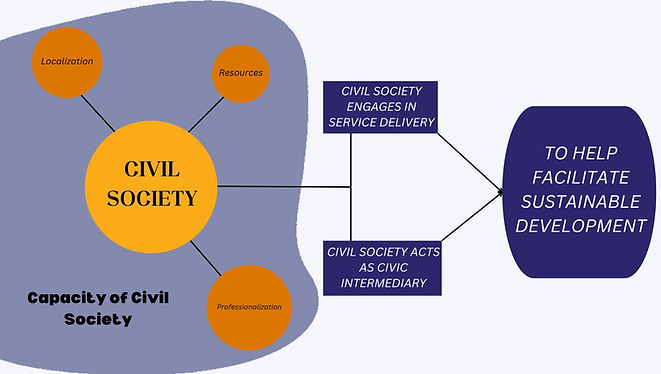

Our Research
Overarching Research Agenda
The Global Development Solutions (GDS) Lab is an interdisciplinary initiative at Auburn University that examines the evolving role of civil society in fostering democratic participation and advancing sustainable development—particularly in African contexts. Our work is grounded in the belief that civil society organizations (CSOs) are essential to building inclusive, responsive, and resilient societies.
The GDS Lab investigates the dual role of civil society:
-
Civic Intermediary – acting as a bridge between citizens and the state by facilitating civic engagement, amplifying marginalized voices, and promoting participatory governance.
-
Service Provider – delivering essential services that supplement or complement state functions, particularly in areas where public infrastructure is weak or absent.
Our research seeks to understand what enables or constrains civil society’s capacity to fulfill these roles. We are especially interested in three interrelated factors:
-
Access to Resources – including financial capital, human talent, and infrastructure, which determine an organization’s operational viability and strategic flexibility.
-
Level of Professionalization – the degree to which CSOs adopt formalized structures, processes, and expertise that enhance their credibility, efficiency, and ability to scale.
-
Presence of Localization – the extent to which organizations are embedded in and responsive to local contexts, cultures, and needs, which affects legitimacy, trust, and long-term impact.
We analyze how civil society organizations navigate complex political, economic, and social environments. Our studies explore how these organizations build capacity, form partnerships, and adapt to shifting conditions—all while striving to remain accountable to the communities they serve. The GDS Lab’s conceptual model (referenced above) visualizes this process, illustrating how internal organizational factors and external systemic conditions interact to shape civil society’s effectiveness. By integrating insights from political science, nonprofit studies, development theory, and design, our work contributes to a more nuanced understanding of how civil society can drive locally grounded, globally informed change.

Elements of Participatory Development Driving
Program Success
This project expands our understanding of participatory development by examning which types and elements of participation are the most effective for engaging community members and positively impacting program outcomes.
Power Dynamics and Positionality in Civil Society Research in the Global South
This project utilizes case studies from third sector research that we have conducted in the Global South to examine the use of research brokers and researcher positionality. The project provides concrete examples of experiences that allow us to reflect on issues that arise during the research process, and help us be mindful of the realities of the research process that require flexibility and adaptation.


Education, Democracy, and Development (EdD): Building Liberian Civil Society Capacity Through Nonprofit Management Education
This project uses participatory action research to improve the quality of life for individuals and communities by building Liberian civil society’s capacity to facilitate development through capacity building and nonprofit management education.
Measuring the Impact of Civil Society on Political Participation in Liberia
This research project increases our understanding of the conditions under which civil society can facilitate political participation in fragile settings. It relies on a field experiment and multi-level modeling to investigate the impact of civil society on various forms of political participation in Liberia, West Africa.


